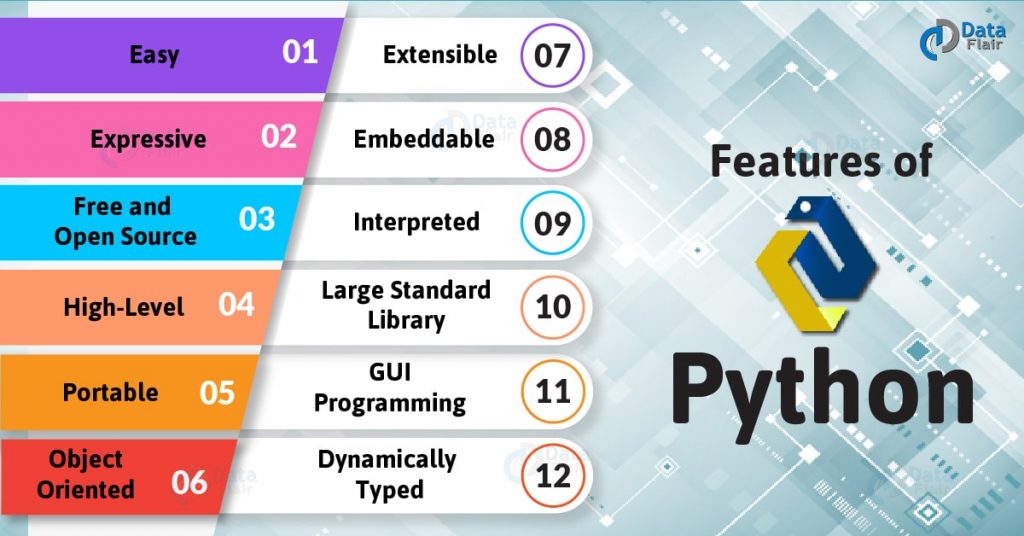Python course with 57 real-time projects - Learn Python
Learn the Features of Python Programming Language that make it so much popular and powerful in the world. Knowing these features will make you love Python. So let’s start!!!
Features of Python
1. Easy
When we say the word ‘easy’, we mean it in different contexts.
a. Easy to Code
Python is very easy to code as compared to other popular languages like Java and C++.
Anyone can learn Basic Python syntax in just a few hours. Thus, it is programmer-friendly.
b. Easy to Read
Being a high-level language, Python code is quite like English. Looking at it, you can tell what the code is supposed to do.
Also, since it is dynamically-typed, it mandates indentation. This aids readability.
2. Expressive
First, let’s learn what is expressiveness. Suppose we have two languages A and B, and all programs that can be made in A can be made in B using local transformations.
However, there are some programs that can be made in B, but not in A, using local transformations. Then, B is said to be more expressive than A.
Python provides us with a myriad of constructs that help us focus on the solution rather than on the syntax.
Technology is evolving rapidly!
Stay updated with DataFlair on WhatsApp!!
This is one of the outstanding python features that tell you why you should learn Python.
3. Free and Open-Source
Firstly, Python is freely available. You can download it from the Python Official Website.
Secondly, it is open-source. This means that its source code is available to the public. You can download it, change it, use it, and distribute it.
This is called FLOSS(Free/Libre and Open Source Software).
As the Python community, we’re all headed toward one goal- an ever-bettering Python.
4. High-Level
Python is a high-level language. This means that as programmers, we don’t need to remember the system architecture.
Also, we need not manage memory. This makes it more programmer-friendly and is one of the key python features.
5. Portable
Let’s assume you’ve written a Python code for your Windows machine. Now, if you want to run it on a Mac, you don’t need to make changes to it for the same.
In other words, you can take one code and run it on any machine. This makes Python a portable language.
However, you must avoid any system-dependent features in this case.
6. Interpreted
If you’re familiar with any languages like C++ or Java, you must first compile it, and then run it. But in Python, there is no need to compile it.
Internally, its source code is converted into an immediate form called bytecode.
So, all you need to do is to run your Python code without worrying about linking to libraries, and a few other things.
By interpreted, we mean the source code is executed line by line, and not all at once. Because of this, it is easier to debug your code.
Also, interpreting makes it just slightly slower than Java, but that does not matter compared to the benefits it offers.
If you have any doubt in DataFlair’s features of python programming language article, drop a comment below and we will get back to you.
7. Object-Oriented
A programming language that can model the real world is said to be object-oriented. It focuses on objects and combines data and functions.
Contrarily, a procedure-oriented language revolves around functions, which are code that can be reused.
Python supports both procedure-oriented and object-oriented programming which is one of the key python features.
It also supports multiple inheritance, unlike Java.
A class is a blueprint for such an object. It is an abstract data type and holds no values.
8. Extensible
If needed, you can write some of your Python code in other languages like C++.
This makes Python an extensible language, meaning that it can be extended to other languages.
9. Embeddable
We just saw that we can put code in other languages in our Python source code.
However, it is also possible to put our Python code in a source code in a different language like C++.
This allows us to integrate scripting capabilities into our program of the other language.
10. Large Standard Library
Python downloads with a large library that you can use so you don’t have to write your own code for every single thing.
There are libraries for regular expressions, documentation-generation, unit-testing, web browsers, threading, databases, CGI, email, image manipulation, and a lot of other functionality.
11. GUI Programming
Software is not user-friendly until its GUI is made. A user can easily interact with the software with a GUI.
Python offers various libraries for making Graphical user interface for your applications.
For this, you can use Tkinter, wxPython or JPython. These toolkits allow you for easy and fast development of GUI.
12. Dynamically Typed
Python is dynamically-typed. This means that the type for a value is decided at runtime, not in advance.
This is why we don’t need to specify the type of data while declaring it.
This is all about the features of the python programming language.
Popular Python Interview Questions
Here are some of the frequently asked Interview Questions from this topic:
- How is Python Portable Language?
- How will you define a Dynamically Typed language?
- What is FLOSS?
- What do you mean by “Python is Expressive”?
- List 10 Features of Python.
Summary
In this tutorial, we learned about various features of Python. We saw that it is interpreted, dynamically-typed, and object-oriented. It is also portable, free, and easy.
Now that’s some motivation to dive into the world of Python. Start learning Python now to give a boost to your Career.
